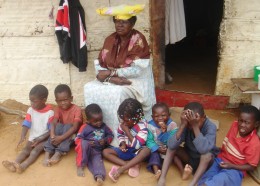
Eleven-year-old Hatani knows that when it comes to HIV, some behaviors are dangerous, and others are perfectly fine. But that doesn’t mean he feels comfortable around people living with the disease.
“I know sharing food with HIV positive people is okay, I cannot get infected,” Hatani says, “but still, I am very afraid to do so.”
This honest young boy’s HIV awareness matches that of many in Namibia, a Sub-Saharan country of 2 million people where just about one out of every five adults are HIV positive.
Namibia has made huge strides with respect to raising awareness and increasing knowledge about HIV at all levels of society. Yet stigmatization of HIV positive people has remained a challenge: It results in a lack of physical and emotional care, leads people to avoid getting treatment, and even contributes to new HIV infections.
HIV stigmatization in Namibia still has deep-seated cultural, social and spiritual roots. Portanto, addressing it has to go beyond teaching facts about HIV at schools. Pais, professores, traditional leaders and clergy all have to be involved, schools need to become open, tolerant and ‘HIV friendly’ places of learning for both students and teachers, and workplace wellness programs that promote treatment and care need to be implemented.
Em outubro 2012, Creative Associates International began work on a Millennium Challenge Account (MCA) project in Namibia, in partnership with Project Hope and the local Legal Assistance Centre. The project sought to build some of these support and learning networks and strengthen the response to the HIV epidemic in all 13 regions of the country using a holistic, localized approach.
The project started with a comprehensive assessment of each region’s HIV response and needs. For example it came out that in some regions traditional chiefs would have to play a pivotal role, and in others, focus would be placed on the attitude of church leaders, health workers or on the parent community.
These assessments in turn informed a four-week tailor-made training for regional education officers. The courses addressed general management and training skills, but also encouraged participants to develop a region-specific response to continued stigmatization and discrimination.
The MCA-funded intervention that followed included support for the two government school-based HIV programs. It trained those who would be educating Life Skills teachers on how to lead courses called My Future is My Choice, for senior students, e Window of Hope for junior learners. These two programs also address issues of stigmatization.
Unfortunately the courses have not yet been implemented at all schools, but where they have, they encourage children and young people to openly talk about HIV, to role-play situations of discrimination, to find ways of changing attitudes of intolerance and avoidance, and to address deep-seated feelings of fear.
Desta maneira, students and their communities contribute to building an ‘AIDS-free Generation’ by generating a sense of shared responsibility and hopefully lowering the actual numbers of new infections.
This learning experience will also result in much more: meaningful dialogue between boys and girls, parents and children, teachers and learners, which can lead to more democratic and open relationships and hopefully a more tolerant and caring society in general.
Erika von Wietersheim is a Material Development Specialist with Millennium Challenge Account-Namibia